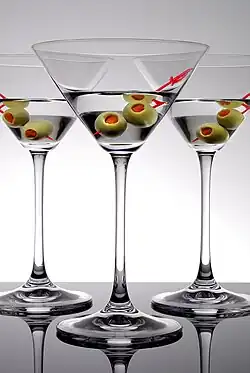Martini

The martini is an iconic cocktail, one of the most famous mixed alcoholic beverages. It developed in the United States around 1900, and is traditionally made with gin and dry vermouth, though it is now commonly made with vodka as well. It is traditionally served in a conical eponymous "martini glass" and garnished with an olive or lemon twist.
Quotes
- The important thing is the rhythm. Always have rhythm in your shaking. Now a manhattan you shake to foxtrot time, a bronx to two-step time, but a dry martini you always shake to waltz time.
- The Thin Man (1934)
- [A martini.] Shaken, not stirred.
- Ian Fleming, character of James Bond.
- Appears in many variants over the years, both in novels and films; see shaken, not stirred for details.
- First appears in the novel Diamonds Are Forever (1956) as (p. 53):
- The waiter brought the Martinis, shaken and not stirred, as Bond had stipulated, and some slivers of lemon peel in a shot glass.
- First said by Bond in the novel Dr. No (1958) as (chapter 15: Pandora's Box):
- And I would like a medium Vodka dry Martini — with a slice of lemon peel. Shaken and not stirred, please. I would prefer Russian or Polish vodka.
- Popularized by the James Bond film series, first said in the first film, Dr. No (1962) by Dr. No as:
- A medium dry vodka martini, lemon peel. Shaken, not stirred.
- First said in film by Bond in the second film, Goldfinger as:
- A martini. Shaken, not stirred.
- I had never tasted anything so cool and clean [as martinis]. They made me feel civilized.
- Ernest Hemingway, A Farewell to Arms (1929), p. 262:
- The sandwiches came and I ate three and drank a couple more martinis. I had never tasted anything so cool and clean. They made me feel civilized. I had had too much red wine, bread, cheese, bad coffee and grappa.
- Preceded by (p. 261):
- The martini felt cool and clean.
- Ernest Hemingway, A Farewell to Arms (1929), p. 262:
- You ought to get out of those wet clothes and into a dry martini.
- Mae West, Every Day's a Holiday (1937)
- Variant:
- Why don't you get out of that wet coat and into a dry martini?
- Robert Benchley, The Major and the Minor (1942)
- Credited to the actor Benchley, who in turn credited it to Charles Butterworth, the actor who delivered the line in Every Day's a Holiday (above)[1][2]
Attributed
Attributed: Quotes found in a reputable secondary source but not sourced to an original work. Read more at Wikiquote:Sourced and Unsourced sections.
- Martinis should never be shaken. They should always be stirred so that the molecules lie sensuously on top of each other.
- W. Somerset Maugham, quoted in Robin Maugham, Conversations with Willie: Recollections of W. Somerset Maugham (1978), p. 106
- [The dry martini is] the only American invention as perfect as a sonnet.
- H. L. Mencken, quoted in Alistair Cooke, Six Men (1977).
- One [martini] is all right, two is too many, three is not enough.
- James Thurber, quoted in Time "People, Aug. 15, 1960" (New York, 15 August 1960) from an interview with Glenna Syse of the Chicago Sun-Times.
Misattributed
Misattributed: Quotes widely associated with an author or work but sourced to another author or work. Read more at Wikiquote:Sourced and Unsourced sections.
- I like to have a martini,
Two at the very most.
After three I'm under the table,
After four I'm under my host.- Misattributed to Dorothy Parker, who did write "One more drink and I'd have been under the host." but who did not write this quatrain. This form is a variant of 1950s humor, of uncertain ultimate origin. See Dorothy Parker § Misattributed for details.
References
- ↑ "'Into a Dry Martini'". The New York Times. July 24, 1994.
- ↑ Keyes, Ralph (2006). The Quote Verifier. Macmillan. p. 33. ISBN 978-0-312-34004-9.